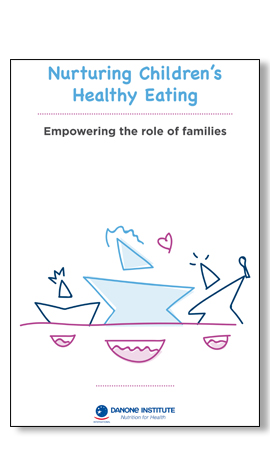Nurturing children’s healthy eating publication
Nurturing children’s healthy eating: empowering the role of families
Childhood is a decisive formative period in which to build the foundations for sustainable healthy eating patterns. That’s why global health begins with the family. In millions of homes around the world, children are learning their eating habits, as well as their education and social behaviour, from their parents, grandparents and siblings. The home environment is a critical source of positive influence as the family shapes both what and how children eat from the time they are born.
However, the traditional family model has been under intense pressur from the challenges of the modern world, with busy parents struggling to balance work and family life, and children becoming increasingly engrossed in smartphones, tablets, televisions and other electroni devices. The result is often less time to prepare and share mealtimes together as a family, and less time to enjoy quality moments together.
Three key pillars to support the role of the family nurturing healthy eating in children
The DII has joined forces with experts in the field to develop a unique perspective on the topic. They have come together to review existing evidence and discuss innovative strategies, to empower families and parents to make positive decisions for nurturing healthy eating in their children.
In order to achieve a positive impact on children’s healthy eating, it is essential to shift the emphasis from “nutrition” to “eating habits” and to consider not only what “we eat” but also “how we eat”. This involves adopting a multi-faceted approach, with the aim of nurturing and instilling positive changes, to support families in creating healthy eating habits.
Three key pillars were identified as supporting the role of the family in nurturing healthy eating in children: Positive parental feeding, Eating together and Healthy home food environment.
DII believes that information pertaining to these three pillars should be communicated through positive practical support and underpinned with the importance of pleasure from eating.

